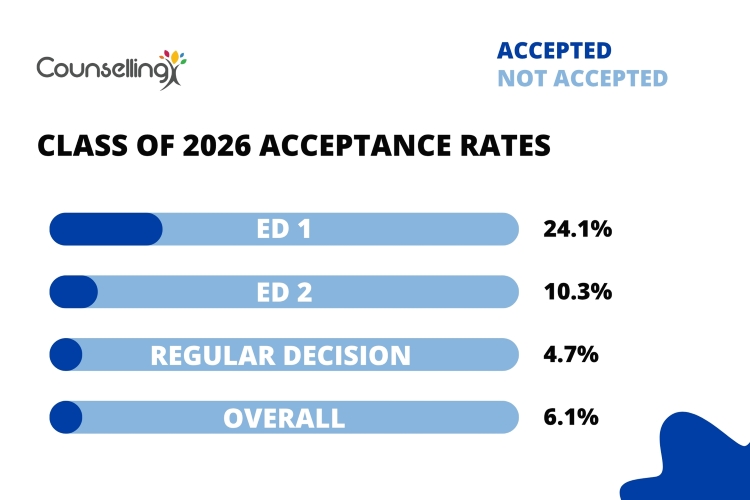When it comes to your high school transcript, your GPA (Grade Point Average) is paramount. For high school students planning to go to college or for parents seeking to gauge their child's academic progress, the GPA is crucial to a student's educational experience. So, what is GPA? And how do weighted and unweighted GPAs differ?
This CounsellingX article covers the fundamentals of GPA, its significance, and its relevance.
We understand the value of grasping educational concepts, and if you're eager to carve out your academic pathway, you're in the right spot.
Are you a student or a parent curious about educational matters? Visit our blog for everything related to college and discover how to apply for scholarships today!
Basics of GPA
Let's begin with the basics. A GPA quantifies a student's academic performance numerically, calculating an average of their grades in each course. Generally, GPAs range from 0.0 to 4.0, with 4.0 being the highest possible score.
It is crucial to recognise that a GPA is not merely a random figure assigned to students. Instead, it reflects their hard work, commitment to studies, and intellectual capabilities.
Additionally, a GPA is a standardised measure for comparing students’ academic achievements, regardless of the varying grading systems across different educational institutions.
What Is a GPA?
A GPA, or Grade Point Average, quantifies a student's academic performance. It incorporates every grade received, rendering it a holistic assessment tool. Additionally, each academic course carries specific credit hours, which indicate the time and effort necessary for completion.
These credit hours significantly influence GPA calculations; more credit hours have a greater effect on the overall GPA.
For instance, if students earn an A in a 3-credit-hour course and a B in a 4-credit-hour course, their GPA will factor in grades and their corresponding credit hours. The A in the 3-credit-hour course yields 12 grade points (4.0 x 3), whereas the B in the 4-credit-hour course results in 12 grade points (3.0 x 4).
The total grade points are then divided by the total credit hours, determining the GPA GPA.
The Significance of GPA in Education Evaluation
But why is GPA so important? If you achieve As and Bs, with the occasional C, you're passing, and that's what matters, right? While that's true, your GPA possesses unique significance concerning academic evaluations. It also indicates a student's consistency, dedication, and depth of knowledge in each subject.
However, the importance of GPA extends beyond being merely consistent and knowledgeable within a specific course. It also plays a vital role in a student's academic future.
For instance, college admissions, university requirements, scholarship eligibility, and future career prospects consider GPA when determining whether a student qualifies for these opportunities. Believe it or not, your GPA can influence the decision between you and another candidate, particularly regarding university admissions.
GPA is one of the most critical factors in college admissions. It offers universities a quick overview of a student's academic capability and showcases their ability to excel in their studies and manage the rigours of higher education.
Nonetheless, while GPA is significant, it does not serve as the ultimate measure of a student's ability or potential. It is merely one aspect of their academic journey and should be viewed with other factors such as extracurricular activities, personal achievements, and letters of recommendation.
What Is a Weighted GPA?
Now that you grasp GPA, let's explore weighted GPA.
A weighted GPA evaluates the difficulty of courses by awarding extra points for grades in honours classes. Its purpose is to encourage students to enrol in advanced courses and reflect a typical college workload.
Moreover, a weighted GPA is calculated by adding additional points to the regular GPA scale. For instance, on an unweighted GPA scale, an A is worth 4 points, a B is worth 3 points, and so on.
On a weighted GPA scale, an A in an honours class might be worth 5 points, and a B 4 points, among others. This calculation indicates that a student's weighted GPA may surpass their unweighted GPA, highlighting their academic efforts and difficulties in their studies and coursework.
Benefits of a Weighted GPA
What benefits does a weighted GPA provide beyond simply ranking higher on the grading scale? A weighted GPA signifies much more than a mere figure. Students with elevated weighted GPAs frequently enjoy better prospects for acceptance into prestigious colleges.
A GPA attracts the attention of admissions officers, showing that these students have successfully tackled challenging courses and are prepared for the demands of a rigorous college setting.
A solid weighted GPA can enhance college application prospects and improve scholarship eligibility. Numerous scholarships consider students' GPAs, boosting their competitiveness for valuable awards.
These financial aids can significantly alleviate college tuition and other related costs, making the journey toward higher education attainable.
What Is an Unweighted GPA?
We recognise the concept of a weighted GPA, but what about an unweighted GPA? How does it stack up, and why is it significant? Let's delve into this topic.
An unweighted GPA serves as a standardised measure that evaluates each course uniformly. It assigns grades on a 4.0 scale, irrespective of course difficulty.
This GPA type enables fair comparisons among students with varying access to advanced academic resources, levelling the playing field.
One significant benefit of the unweighted GPA is its straightforwardness. Since all courses are evaluated equally, colleges and universities can quickly assess students' academic performance without complex calculations or adjustments.
Nevertheless, some critics argue that an unweighted GPA does not accurately capture a student's academic potential, particularly if the student has taken more challenging courses that aren’t reflected in the GPA.
Students who succeed in advanced classes might feel that their hard work isn’t adequately represented by their unweighted GPA, which can raise concerns for those who aim to impress selective colleges and universities.
Differences Between Weighted and Unweighted GPA
Now that we've explored the meanings of weighted and unweighted GPAs, let's examine the key differences between these scaled GPAs.
College Admissions Impact
Knowing which side of the GPA measuring scale the school values is essential when applying to college or university.
While some admissions consider the weighted GPA, others might stand more neutral and focus on the unweighted GPA.
Some colleges may recalculate a student's GPA based on their criteria to make the admissions process even more level.
This can significantly impact a student's chances of admission, as it alters the college's perception of their GPA.
Eligibility Criteria in Scholarship
Competition over GPAs extends beyond college admissions. Similar to university standards, scholarship organisations may have varied criteria for evaluating GPAs, which can be beneficial.
Some scholarships emphasise weighted GPAs to reward students who challenge themselves with advanced courses, while others prefer unweighted GPAs to ensure equal opportunities regardless of the academic path chosen.
For scholarships prioritising weighted GPAs, students taking honours classes gain an edge.
Their elevated GPA reflects their ability to manage rigorous coursework, often seen as a sign of future success.
These scholarships aim to acknowledge students who set high academic standards for themselves; the greater the challenge, the greater the potential reward.
Conversely, some scholarships focus on unweighted GPAs to provide equal opportunities for all students, regardless of their academic backgrounds.
These awards recognise that not all schools offer advanced or honours courses, thus levelling the playing field by assessing students based on their overall performance.
This approach enables students from underprivileged backgrounds to compete for scholarships on equal terms.
Comparison Between Weighted and Unweighted GPA
Understanding the distinctions between weighted and unweighted GPAs involves several key factors:
Weighted and unweighted GPAs represent two distinct methods for calculating a student's grade point average. Though both aim to assess academic performance, they consider different aspects and produce varying outcomes.
A weighted GPA quantifies the difficulty level of a student's courses, whereas an unweighted GPA treats all courses the same, irrespective of their complexity.
So, how do you determine which GPA is correct for you? Let's explore this further.
Things to Consider
When deciding between a weighted and unweighted GPA, an important aspect to evaluate is the presence of advanced or honours courses at your school. Opting for a weighted GPA could be advantageous if your institution provides numerous challenging courses. A weighted GPA reflects your capacity to thrive in rigorous academic environments.
Additionally, consider your scholarship goals. Investigating potential scholarships can guide your decision-making for your educational journey. Specific colleges may prioritise weighted GPAs, while others might emphasise unweighted GPAs exclusively. Understanding the GPA standards for your preferred scholarship can be extremely helpful.
PLEASE NOTE: Some colleges and universities may specifically consider weighted GPA when evaluating applicants. If you aspire to attend a highly competitive institution, having a weighted GPA could give you an advantage during admissions.
Taking the Right Decision
But which GPA is right for you? To put it simply, the decision between weighted and unweighted GPA depends on your personal goals, but we recommend the following when weighing your options (no pun!):
Reflect on your academic strengths and aspirations to make the choice that aligns with your educational journey.
Seek guidance from the counsellors or academic advisors at CounsellingX. They can provide valuable insight into what is most beneficial for you and your future.
Talk to your peers who have already made this decision for a broader perspective.
But remember, your GPA is just one aspect of your academic profile. Admissions officers and scholarship committees also consider other factors, such as standardised test scores, extracurricular activities, essays, and letters of recommendation.
Therefore, while your GPA is important, it is not the sole factor determining your future educational opportunities.
FAQs
- Which GPA do colleges prioritise?
Colleges review both but emphasise context. Top schools value weighted GPAs for rigour, while others prefer unweighted for uniformity. Always check school-specific policies and report both if required.
- Does a weighted GPA boost scholarship chances?
Yes. Scholarships often reward course rigour. A higher weighted GPA can strengthen applications, especially for merit-based awards. However, some use unweighted to standardise comparisons.
- Can I convert my GPA between systems?
No direct conversion exists. Colleges recalculate GPAs using their criteria. Report both on applications if allowed, and explain your school’s grading policy in additional notes.
- How do I know which GPA my school uses?
Check transcripts or consult your counsellor. Most schools list both GPAs, but if only one is reported, confirm whether it’s weighted or unweighted.
- Will unweighted GPAS disappear by 2025?
Unlikely. Both systems remain relevant. However, trends show colleges increasingly contextualise GPAs with school profiles, reducing reliance on a single metric.











